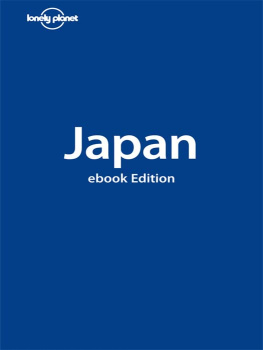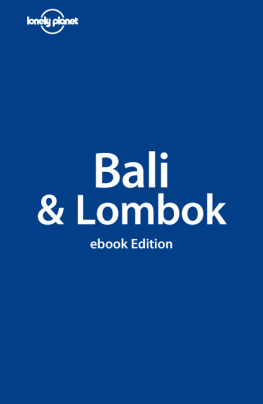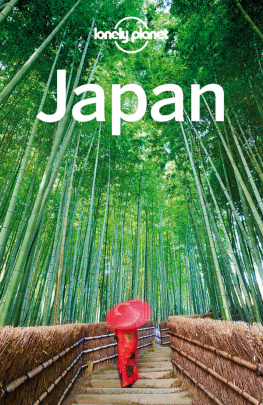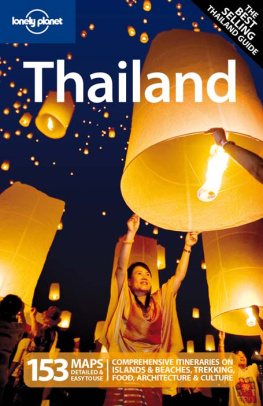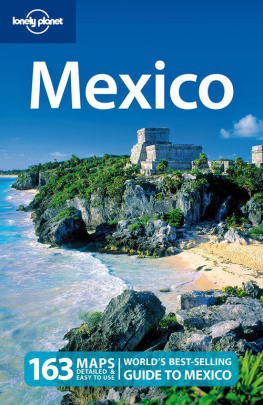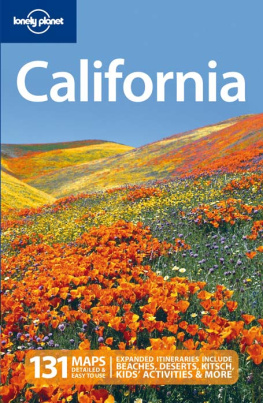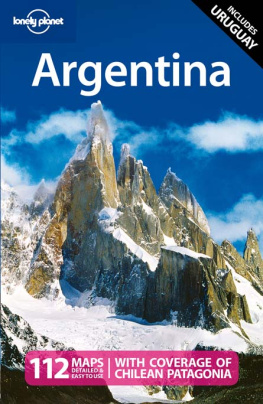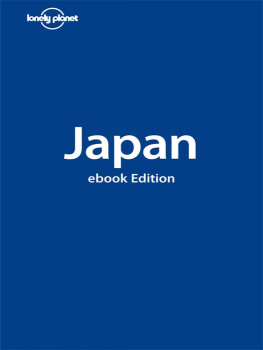Destination Japan
FAST FACTS
Population: 127 million
Female life expectancy: 84.5 years
Literacy rate: 99%
GDP: US$3.7 trillion (estimated)
Latitude of Tokyo: 35.4N, the same as Tehran, and about the same as Los Angeles (34.05N) and Crete (35N)
Islands in the Japanese archipelago: approximately 3900
Number of onsen (hot springs): more than 3000
Worlds busiest station: Tokyos Shinjuku Station, servicing 740,000 passengers a day
Money spent on manga (comics) each year in Japan: 481 billion (about US$5 billion)
Cruising speed of the shinkansen (bullet train): 300km/h
Japan is a world apart a wonderful little planet floating off the coast of mainland China. It is a kind of cultural Galapagos, a place where a unique civilisation was allowed to grow and unfold on its own, unmolested by invading powers. And while there has been a lot of input from both Western and Eastern cultures over the millennia, these have always been turned into something distinctly Japanese once they arrived on the archipelago.
Even today, the world struggles to categorise Japan: is it the worlds most advanced technological civilisation, or a bastion of traditional Asian culture? Has the country become just another outpost of the West, or is there something decidedly Eastern lurking under the veneer of its familiar modernity? There are no easy answers, but there is plenty of pleasure to be had in looking for them.
First and foremost, Japan is a place of delicious contrasts: ancient temples and futuristic cities; mist-shrouded hills and lightning-fast bullet trains; kimono-clad geisha and suit-clad businesspeople; quaint thatch-roofed villages and pulsating neon urban jungles. This peculiar synthesis of the modern and the traditional is one of the things that makes travel in Japan such a fascinating experience.
For all its uniqueness, Japan shares a lot with the wider world, and this includes the state of the economy. Japan has been severely affected by the worldwide recession that started with the US sub-prime loan crisis of 2008. Japans export-driven economy has always been sensitive to economic health of its trading partners, particularly the USA. Indeed, it has often been observed that when America sneezes, Japan catches a cold. And this time, Japan has caught a whopper.
As housing prices fell and the stock market tanked in the USA, Americas profligate consumers stopped buying Japanese products. The effect on the Japanese economy was almost immediate. Exports in January 2009 were down an astonishing 46% compared to the previous year. For a nation that exports about 20% of its total manufacturing output, this sort of decline can only be termed apocalyptic, and the bursting of Japans famous Bubble Economy in the late 80s is starting to look tame by comparison.
To add insult to injury, just as the worlds consumers have stopped buying Japanese products, the worlds currency traders have been snapping up the Japanese yen, making it one of the worlds most valuable currencies. This has made Japans exports even less attractive to foreign buyers. This one-two economic punch has left the nation reeling, and Japanese newspaper headlines are a daily litany of economic woes, from shrinking tax receipts, to massive layoffs, to huge corporate losses. Its too early to tell how all of this will play out in the coming months and years, but one thing is certain: many businesses will probably close (including some listed in the pages of this guide).
To make matters worse, the present economic crisis is unfolding against a backdrop of two other severe problems: Japans low birth rate (the second-lowest in the industrialised world after Italy) and ageing population. Japans population peaked in 2006 at 127.46 million and is estimated to have fallen by almost 400,000 people by mid-2009. Experts predict that it may drop as low as 100 million by the year 2050, which begs the question: who will work in the factories and who will take care of the elderly as time passes?
In order to address the problem, Japan has recently been experimenting with a solution familiar to those in Hong Kong: importing workers from Southeast Asia. Japan recently changed its visa policies to allow nurses from countries such as Indonesia, Vietnam and the Philippines to work in Japan on a temporary basis. Critics have assailed the plan as inherently racist, as these nurses are not eligible for eventual permanent residence. However, many observers see foreign nurses as the first wave of overseas workers who may eventually change Japans traditionally conservative (some would say xenophobic) attitudes towards immigration.
Changes are also taking place in many other spheres of Japanese life. The traditional foundations of Japanese life cradle-to-grave employment, age-based promotion, and a strong social safety net are gradually being abandoned in favour of an economy based on more flexible labour conditions and a tightening of privatised government services (eg in the case of the post office). Now, rather than priding itself on being a country where everyone is a member of the middle class, there is talk of a nation composed of two distinct classes: the kachi-gumi (winners) and make-gumi (losers).
Fortunately, it appears that the politicians and corporations behind these changes may have overplayed their hand, and the slightly more progressive Democratic Party of Japan has been gaining ground in the polls recently, based largely on popular discontent with the negative effects of the new economic model.
Relations (or lack thereof) with nearby North Korea continue to be a perpetual source of concern for the Japanese. In 2006 North Korea successfully tested a nuclear bomb. In April 2009 the country launched a rocket over Japan. While the North Koreans insisted the payload was a nonmilitary satellite, many Japanese feared that it was intended to demonstrate the ability of North Korea to lob a warhead over the Sea of Japan (they also feared that jettisoned parts from the rocket would fall on Japan). While American and Japanese analysts later concluded that the test was a failure, this did little to calm Japanese nerves.
Of course, the news is not all bad in Japan. Three Japanese scientists shared the 2008 Nobel Prize in physics, and the Japanese athletes garnered 26 medals in the Beijing Olympics, more than at any previous Olympics. The film Okuribito (Departures), by Japanese director Takita Yojiro, won an Oscar for best foreign film, and interest in Japanese manga (comics) and anime continues to soar. Meanwhile, the country continues to expand its brilliant shinkansen (bullet train) system, already the worlds most extensive high-speed train network.
Japans tourist economy has attracted travellers not only from the West, but also from neighbouring Asian countries such as China, Korea, Taiwan and Singapore. Australian skiers have flocked to ski areas like Niseko, so much so that some Japanese have started referring to the area as little Australia. Though tourist numbers have waned in recent times, it seems a safe bet that as the world recovers from recession, Japan will continue to increase in popularity, as more and more people are drawn to a country that manages to be both utterly foreign and incredibly welcoming.
Getting Started
Japan is Asias most user-friendly country. Its incredibly efficient, clean and safe. Indeed, many travellers will find it easier to travel around Japan than to travel in their home countries. While English is not widely spoken, communication is not as difficult as you might think more and more Japanese are able to speak some English, and youll find English signs in train stations, airports and, increasingly, major cities. Another concern is cost: as this book went to press, the yen was soaring versus many world currencies. However, costs within Japan have remained stable for years, and it can actually be cheaper to travel in Japan than in Western Europe and North America.

